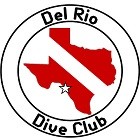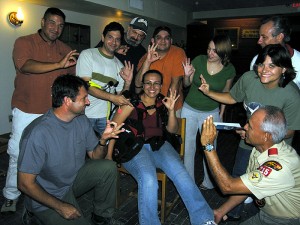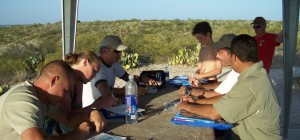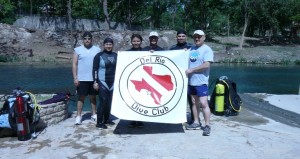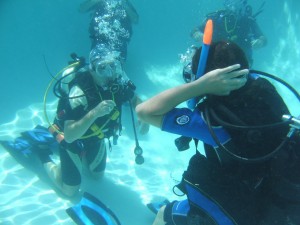If you are a diver in the local area we would like to get to know you! We don’t have a dive shop in town anymore (although that may be about to change) and we are challenged by the very fluid population in Del Rio of likely divers. Getting together, however, is a way to get to know other divers, their experiences and share diving opportunities here. We have Lake Amistad and San Felipe Creek for local diving, but depending on your willingness to drive, there are other places worth checking out, too: Chalk Bluff, Frio River, Balmorhea State Park, just to name a few. Although very informal, the Del Rio Dive Club meetings serve as a chance for divers and non-divers alike to gather, share, ask questions and enjoy a bite to eat. We typically meet at Rudy’s Restaurant for some great barbecue 7pm on the third Thursday of each month. This is our opportunity for local divers to plan more activities and do more DIVING! You don’t have to be a diver to come out and have a good time. Maybe you’ll even get the bug for it just by hanging around us! Don’t forget to like our Facebook page so you can keep up with what’s going on. Sadly, there has not been much interest in the past year, and a meeting of one or two isn’t productive. If we see more activity happening on our Facebook page we will spin meetings back up. All too often we run into certified divers who move to the area but have sold their gear because they either didn’t know there was diving here or simply aren’t interested in fresh water diving. All we can say is: A C-card means you can dive, but diving makes you a diver!
Monthly Archives: May 2013
Help Spread The Word!
A club is nothing without people. And with today’s wide spread of social media, we’re hooking into different ways to make people aware that, yes, there ARE people diving in the Del Rio area! So, we’d like to encourage everyone to not just visit our website, Facebook page, UStream channel or YouTube channel, but subscribe, follow and like us, too! That way you get the latest information and get helpful reminders when things are going on! And word-of-mouth (verbally or electronically) is still one of the best ways to expand. Help us out by sharing!
We invite your comments, questions and suggestions. You may contact us via the following:
General Information: drdc@delriodiveclub.com
Club President: Rob Wade / 830.774.2992 / Robert.wade@cetifox.net
Vice-President: Robert Garza / rsgarza821@yahoo.com
Correspondence: DRDC / 507 W. 14th / Del Rio, TX 78840
The Del Rio Dive Club was establish in 2007 as a way to gather active divers as well as non-divers interested in the sport and increase awareness of scuba diving in the Southwest Texas area. Normally, dive shops are a natural nexus for divers. Since Del Rio has none, the club serves as a surrogate. We make ourselves available to organizations and educational institutions to help share the sport in a number of venues. The club also participates in citywide cleanup efforts, focusing on the San Felipe Creek area. Del Rio Dive Club also has a PADI instructor who independently conducts classes and orientation. The transitory nature of a large portion of our potential membership means we have a small core of permanent members, so there currently is no sponsorship of dive trips, etc., although frequent group dives are organized for divers to participate in.
We’re slowly approaching a new dive season, folks! Time to break out your gear (if you haven’t been diving over the winter) and check everything out. After a long and intermittent hiatus due to hardware, software and service provider problems, we’re coming back with new episodes of This Guy Who Dives. Catch previous episodes at www.youtube.com/user/cetifoxproductions and episodes older than 73 at www.youtube.com/user/scubadog2008 .
The Two Guys Who Dive netcast began in January of 2012 as a bit of an experiment. The two most prolific divers in the area, ScubaDog and Scuba Bob, had toyed around with ideas to increase awareness of the sport that would also be fun. When they finally settled on the idea of a live streaming netcast it sparked a considerable amount of work. What was already being used as a home music studio was renovated and updated with some new equipment that could support video podcasts. It’s been a learning experience for both, in terms of format and in terms of technology, and you can see the gradual progress made over the first year if you view the netcasts on YouTube.
Almost four years later, the show is still going, albeit with a name change to This Guy Who Dives (do to Scuba Bob bowing out for other challenges). This show is not just about scuba diving, but includes topics of local, regional and national interest, frequently involving technology and some politics (particularly if it affects the dive industry), reviews of movies, restaurants and much more. Viewers are invited to participate in the chat room while the show is live and encouraged to subscribe to the YouTube channel to catch the shows afterward.
You can see Two Guys Who Dive on its new night — Sundays at 8pm Central — and at its new location (Facebook Live) at https://www.facebook.com/DelRioDiveClub/.
Although not official a part of the Del Rio Dive Club, scuba diving certification is available locally. Robert Wade is a certified instructor with PADI (Professional Association of Diving Instructors), #234370, and has been teaching classes including Basic Open Water, Advanced Open Water, Rescue Diver and Divemaster since 2008. An avid diver since 1985, Robert (aka ScubaDog) has consistently maintained the high standards of the PADI curriculum while keeping the classes fun and interesting. His primary motivation for teaching scuba diving has always been to share wonder and excitement of the sport with anyone willing to try. Classes are structured to give students plenty of self-study time and then maximizing value with the in-class and in-water portions.
A regular course schedule has not been planned for 2024 due to the extremely low lake conditions. Lake Amistad continues to drop and the visibility has remained pretty steady at zero. Recreational diving is supposed to be fun and relaxing, and most students have significant anxiety mastering skills in open water when conditions are this adverse. As a result, we must limit class sizes to two and students must already be very comfortable in open water.
If you have considered the challenges, conditions and risks and are still interested feel free to contact us to work out a schedule. While PADI’s eLearning option for the academics portion is now the primary method to get started, you can also choose to accomplish the academics via DVD & workbook followed by evening classroom review & tests. Once the academic portion is complete you will accomplish the practical application in a pool and open water.
Basic Open Water classes are $325 per person or $425 for private instruction. This price includes the eLearning academics or student Open Water Pak (workbook, dive tables (aka Recreational Dive Planner) logbook, instructional DVD, the formal instruction) and use of a BC (buoyancy compensator), pressure gauge & dive computer console, tanks and weights. Students must supply their own personal gear: wetsuit, boots, mask, fins, snorkel and submersible watch. Students must also be able to swim 200 meters (any style or styles, not in a wetsuit) or 300 meters with mask and fins and tread water for 10 minutes. After successfully completing all required course objectives students will be given a signed temporary certification card with their permanent card to arrive typically 2-3 weeks later. Newly-certified divers are encouraged to dive as often as possible after getting certified in order to build more confidence in the fresh dive skills. NOTE: If you have completed the PADI eLearning portion with another instructor or dive shop please bring your documentation to complete the in-water portion of the course, the cost is $240.
Prior to considering taking the course you should download the following documents: http://www.delriodiveclub.com/wp-content/uploads/2013/05/THINGSTOKNOW.pdf and http://www.delriodiveclub.com/wp-content/uploads/2022/06/Diver_Medical_Participant_Questionnaire_2022_02_1.pdf. The first document provides more depth and detail to the requirements of the course, format of the instruction and my personal notes. The second document is a Medical Statement that you’ll need to fill out. In some cases you may find that a physician is needed to evaluate your specific condition and make a determination if it is safe for you to dive. As always, if you have any questions feel free to contact me.
Note for classes that happen to be held in April/May: The water temps are typically still quite chilly–70 at the surface, upper 50’s at depth. You will need, at a minimum, a 5mm full wetsuit.
L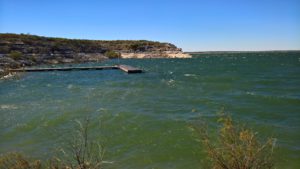 ake levels at Amistad have been somewhat volatile over the past few years. Every couple of years the level has been low enough to open Spur 454 up and allow people to drive all the way out to the cliffs there. This was actually a great place to shore dive because it allowed incredibly easy access — in fact, I’d argue it’s the best shore diving on Amistad. However, the levels have been rising and, as of June 2019, the Park Service has it closed. In the meantime, some improvements have been made by the Park Service to Scuba Cove, near Diablo East.
ake levels at Amistad have been somewhat volatile over the past few years. Every couple of years the level has been low enough to open Spur 454 up and allow people to drive all the way out to the cliffs there. This was actually a great place to shore dive because it allowed incredibly easy access — in fact, I’d argue it’s the best shore diving on Amistad. However, the levels have been rising and, as of June 2019, the Park Service has it closed. In the meantime, some improvements have been made by the Park Service to Scuba Cove, near Diablo East.
It’s important to remember that Amistad Lake is a flood-control reservoir as its mandated function, which is why lake levels can dramatically change. Water temperatures range from 50 during winter to 80+ in August. Visibility can at times be deceiving. Visibility is normally going to look better vertically through the water column than horizontally, so walking along the shore or looking down from a boat may give a false sense of clarity for diving. Visibility can be as bad as 4 feet or as great as 30 feet. Typically, it’s about 15 feet. Conditions that most often negatively affect visibility at Amistad: high winds, local precipitation (causing run-off), upstream precipitation (bringing sediment, etc., from the Rio Grande, Pecos or Devil’s rivers), algae blooms (as water warms up, algae expands).
Above is a recent image of Scuba Cove, adjacent to Diablo East. As you can see, there’s a new dock, new buoys, and the winds were high.
